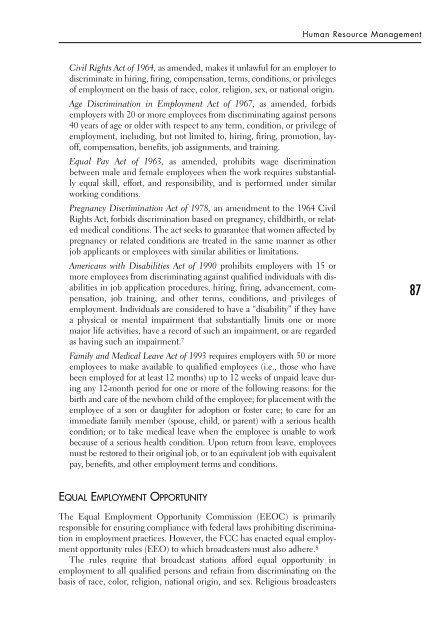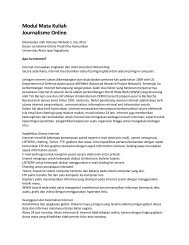- Page 1 and 2:
ELECTRONIC MEDIA MANAGEMENT Fifth E
- Page 3 and 4:
ELECTRONIC MEDIA MANAGEMENT Fifth E
- Page 5 and 6:
Table of Contents Preface xiii Ackn
- Page 7 and 8:
Union Negotiations 83 Reasons for J
- Page 9 and 10:
The Promotion Plan 194 Audience Pro
- Page 11 and 12:
Organization and Personnel 289 Mana
- Page 13 and 14:
Preface Every generation probably w
- Page 15 and 16:
Acknowledgments Terry Bonvillain, C
- Page 17 and 18:
1 Broadcast Station Management This
- Page 19 and 20:
MANAGEMENT DEFINED If you were to a
- Page 21 and 22:
To assist managers in carrying out
- Page 23 and 24:
of two or more persons.” As emplo
- Page 25 and 26:
who saw their employees as having a
- Page 27 and 28:
FIGURE 1.3 Systems approach to orga
- Page 29 and 30:
Organization. In the intervening ye
- Page 31 and 32:
ORGANIZING Organizing is the proces
- Page 33 and 34:
Local Sales Assistant General Sales
- Page 35 and 36:
station. As a result, employee mora
- Page 37 and 38:
DECISIONAL ROLES These roles grow o
- Page 39 and 40:
THE LICENSEE Ultimate responsibilit
- Page 41 and 42:
attentive to the treatment of emplo
- Page 43 and 44:
SUMMARY Management is defined as th
- Page 45 and 46:
13 Herzberg, Mausner, and Snyderman
- Page 47 and 48:
2 Financial Management This chapter
- Page 49 and 50:
THE ACCOUNTING FUNCTION The account
- Page 51 and 52: Station ________________ Delta Star
- Page 53 and 54: Station ________________ Delta Star
- Page 55 and 56: FIGURE 2.2 Vendor proposal to desig
- Page 57 and 58: RECEIPTS FIGURE 2.4 Financial recor
- Page 59 and 60: Current liabilities include account
- Page 61 and 62: FIGURE 2.6 Example of a broadcast s
- Page 63 and 64: • recordings • music licensing
- Page 65 and 66: FIGURE 2.7 Broadcast station income
- Page 67 and 68: B. Each employee’s workload shoul
- Page 69 and 70: 5. Insurance Insurance has become a
- Page 71 and 72: MONITORING FINANCIAL PROGRESS Manag
- Page 73 and 74: The stock market has begun to quest
- Page 75 and 76: ADDITIONAL READINGS Jablonsky, Step
- Page 77 and 78: Human Resource Management This chap
- Page 79 and 80: Job analysis identifies the respons
- Page 81 and 82: Application For Employment Hometown
- Page 83 and 84: EDUCATION: Name & Location Course S
- Page 85 and 86: The interview gives the station the
- Page 87 and 88: A letter should be mailed to the un
- Page 89 and 90: • Has the immediate supervisor ha
- Page 91 and 92: • initiative • knowledge of com
- Page 93 and 94: Pension plan: Provided by fewer tha
- Page 95 and 96: their departments or transfer to an
- Page 97 and 98: The basic unit of a national or int
- Page 99 and 100: of meal breaks, reimbursement to em
- Page 101: 3. Management Attitudes and Behavio
- Page 105 and 106: • analyze periodically measures t
- Page 107 and 108: FIGURE 3.2 Continued. Human Resourc
- Page 109 and 110: licensees each year. Managers can t
- Page 111 and 112: Managers are advised to develop and
- Page 113 and 114: ignored. They may feel uncomfortabl
- Page 115 and 116: EXERCISES 1. Was the station manage
- Page 117 and 118: 4 Broadcast Programming This chapte
- Page 119 and 120: The reach of television and the ext
- Page 121 and 122: and promotional announcements. They
- Page 123 and 124: Program management: The duties of t
- Page 125 and 126: • tactical, that is, methods of p
- Page 127 and 128: Traffic reports: Local traffic cond
- Page 129 and 130: Examples of locally produced inform
- Page 131 and 132: greater the coverage. Coverage also
- Page 133 and 134: Commercials Headlines FIGURE 4.3 Fo
- Page 135 and 136: mercials and other nonmusic content
- Page 137 and 138: the market, the age of the program,
- Page 139 and 140: PROGRAMMING FACTORS The TV program
- Page 141 and 142: years, making it difficult for a st
- Page 143 and 144: 10. Don’t place an expensive prog
- Page 145 and 146: Early Morning (6:00 A.M. to 9:00 A.
- Page 147 and 148: often run movies, syndicated talk,
- Page 149 and 150: Late Fringe During this period, mos
- Page 151 and 152: achieve the strongest possible lead
- Page 153 and 154:
FIGURE 4.5 Continued. The guideline
- Page 155 and 156:
FIGURE 4.5 Continued. outside the b
- Page 157 and 158:
Broadcast Programming was 36, up fr
- Page 159 and 160:
ular subgroup of the population, id
- Page 161 and 162:
The board will be meeting again in
- Page 163 and 164:
This chapter considers 5 Broadcast
- Page 165 and 166:
• produce a profit for the statio
- Page 167 and 168:
• Preparing and controlling the d
- Page 169 and 170:
• controlling the department’s
- Page 171 and 172:
• Only the cost of 30-second spot
- Page 173 and 174:
tion for buying other spots. The ef
- Page 175 and 176:
commercial time in programs directe
- Page 177 and 178:
LOCAL AND REGIONAL SALES: THE ACCOU
- Page 179 and 180:
Day Activities 1. Tour of station a
- Page 181 and 182:
• availabilities, to show how the
- Page 183 and 184:
4. What do they offer customers tha
- Page 185 and 186:
of the audience, personality profil
- Page 187 and 188:
• past and present advertising ac
- Page 189 and 190:
“I tried your station once and I
- Page 191 and 192:
established revenue goal with a fou
- Page 193 and 194:
To represent the station effectivel
- Page 195 and 196:
Advantages Disadvantages Diary Prov
- Page 197 and 198:
AUDIENCE MEASUREMENT TERMINOLOGY To
- Page 199 and 200:
Gross impressions (GIs): The total
- Page 201 and 202:
However, in an era of intensive inv
- Page 203 and 204:
Sales and advertising practices are
- Page 205 and 206:
NOTES 1 47 CFR 73.1941(c). 2 Ibid.,
- Page 207 and 208:
6 Broadcast Promotion and Marketing
- Page 209 and 210:
• evaluating campaigns • conduc
- Page 211 and 212:
ers to sample the station’s progr
- Page 213 and 214:
are important in establishing or re
- Page 215 and 216:
The television supplement published
- Page 217 and 218:
FIGURE 6.4 A station’s logo may b
- Page 219 and 220:
schedule, interests, and personalit
- Page 221 and 222:
station should consider ways in whi
- Page 223 and 224:
Assuming that the contest idea rais
- Page 225 and 226:
same goes for reality programs, sit
- Page 227 and 228:
ing costs by including the promotio
- Page 229 and 230:
Target Clients Will the campaign be
- Page 231 and 232:
Mailings or E-mails to actual and p
- Page 233 and 234:
of deriving benefits and minimizing
- Page 235 and 236:
The mall will make a $10,000 advert
- Page 237 and 238:
7 Broadcast Regulations This chapte
- Page 239 and 240:
which had already been legislating
- Page 241 and 242:
• The level of understanding and
- Page 243 and 244:
Cohn and Marks LPP provides special
- Page 245 and 246:
APPLICATION AND REPORTING REQUIREME
- Page 247 and 248:
typical station quarterly issues/pr
- Page 249 and 250:
FIGURE 7.4 Continued. the seller an
- Page 251 and 252:
UHF stations to count for only one-
- Page 253 and 254:
PROGRAMMING POLICIES Programming po
- Page 255 and 256:
cast. Thus, even if the proposed br
- Page 257 and 258:
FAIRNESS DOCTRINE The Fairness Doct
- Page 259 and 260:
The 1987 indecency standard has bee
- Page 261 and 262:
ON-THE-AIR HOAXES The electronic me
- Page 263 and 264:
If a broadcast station or network a
- Page 265 and 266:
exceptions to the general rule. Fir
- Page 267 and 268:
e made public, or the licensee beli
- Page 269 and 270:
REGULATORY FEES The Omnibus Budget
- Page 271 and 272:
opposes. It will contain visual foo
- Page 273 and 274:
28 New Indecency Enforcement Standa
- Page 275 and 276:
8 Managing the Cable Television Sys
- Page 277 and 278:
usiness, and establishes the terms
- Page 279 and 280:
extremely important. It should incl
- Page 281 and 282:
Accounting Inventory Clerk Accounts
- Page 283 and 284:
And stiff competition has arrived i
- Page 285 and 286:
The 1992 law considerably reduces p
- Page 287 and 288:
FIGURE 8.4 Excerpt from a PPV marke
- Page 289 and 290:
FIGURE 8.5 Cable tiers. (Source: Co
- Page 291 and 292:
account balance and the date and am
- Page 293 and 294:
Cable has about twice the number of
- Page 295 and 296:
Technical salaries Utilities Techni
- Page 297 and 298:
In response, Congress passed the Ca
- Page 299 and 300:
FIGURE 8.10 Analysis of multichanne
- Page 301 and 302:
He faces a dilemma: should he retai
- Page 303 and 304:
9 Public Broadcast Station Manageme
- Page 305 and 306:
1. local noncommercial educational
- Page 307 and 308:
• engineering • administration
- Page 309 and 310:
cause a fatigue factor in the audie
- Page 311 and 312:
Special events are an additional so
- Page 313 and 314:
FIGURE 9.4 Support elements for WYE
- Page 315 and 316:
FIGURE 9.5 Expense dollar distribut
- Page 317 and 318:
ee. Among the many sources for inst
- Page 319 and 320:
popular publication called New Orle
- Page 321 and 322:
Additional ratings information is a
- Page 323 and 324:
An example can explain the center
- Page 325 and 326:
Administration is the management fu
- Page 327 and 328:
FEDERAL GOVERNMENT Public radio rel
- Page 329 and 330:
FIGURE 9.9 Revenue distribution for
- Page 331 and 332:
Jazz is mainly recorded music and l
- Page 333 and 334:
Companion and Michael Feldman’s W
- Page 335 and 336:
FIGURE 9.11 Who WWOZ’s listeners
- Page 337 and 338:
LOW-POWER FM RADIO In 2000, the FCC
- Page 339 and 340:
tal funds, public television has be
- Page 341 and 342:
NOTES 1 http://www.fcc.gov. 2 Ibid.
- Page 343 and 344:
10 Entry into the Electronic Media
- Page 345 and 346:
There are several ways of accumulat
- Page 347 and 348:
FIGURE 10.2 Cable television help w
- Page 349 and 350:
tions wanted” ads, and associatio
- Page 351 and 352:
the opportunities offered by libera
- Page 353 and 354:
than 9,000. The major trading activ
- Page 355 and 356:
FIGURE 10.6 Continued. Despite the
- Page 357 and 358:
FIGURE 10.7 Continued. The receipt
- Page 359 and 360:
FIGURE 10.8 Media broker’s announ
- Page 361 and 362:
the return on investment will be le
- Page 363 and 364:
The multiple will vary depending on
- Page 365 and 366:
NON-TRADITIONAL FINANCING As one of
- Page 367 and 368:
FIGURE 10.9 Continued. provided goo
- Page 369 and 370:
FIGURE 10.10 Acquisition company du
- Page 371 and 372:
FIGURE 10.11 Excerpt from FCC Form
- Page 373 and 374:
Consumer Protection and Competition
- Page 375 and 376:
in a proposal. Local governments ha
- Page 377 and 378:
FIGURE 10.13 Continued. constructio
- Page 379 and 380:
lier years. And the reduced number
- Page 381 and 382:
EXERCISES 1. Name three types of fi
- Page 383 and 384:
A Appendix TV Parental Guidelines T
- Page 385 and 386:
B Appendix Excerpt from Membership
- Page 387 and 388:
Appendix B 371
- Page 389 and 390:
Appendix B 373
- Page 391 and 392:
Appendix B 375
- Page 393 and 394:
Appendix B 377
- Page 395 and 396:
Glossary Acceptable Use Policy (AUP
- Page 397 and 398:
Community Service Grant (CSG): a gr
- Page 399 and 400:
Focus group: a research method in w
- Page 401 and 402:
Management: the process of planning
- Page 403 and 404:
Pretax loss: the excess of expenses
- Page 405 and 406:
Trade-out: see barter. Trailing cas
- Page 407 and 408:
The first part of the bibliography
- Page 409 and 410:
Crandall, Robert W., and Harold Fur
- Page 411 and 412:
Jablonsky, Stephen F., and Noah P.
- Page 413 and 414:
Radio Marketing Guide & Fact Book,
- Page 415 and 416:
Broadcast Engineering. Primedia Bus
- Page 417 and 418:
Accounting, 33-49 planning financia
- Page 419 and 420:
Bumper, 116 Bureaucracy, 6 Business
- Page 421 and 422:
Electronic media business, entry in
- Page 423 and 424:
Food, Drug, and Cosmetic Act, 225 R
- Page 425 and 426:
top, 13 traffic, 16 Market area, de
- Page 427 and 428:
fixed-position, 210 image, 195, 217
- Page 429 and 430:
Roethlisberger, Fritz J., 7 Rotatio
- Page 431 and 432:
Unions, trade, 80-86 contracts, 81-
















